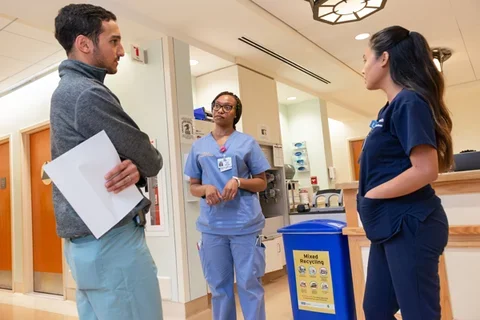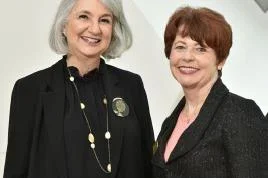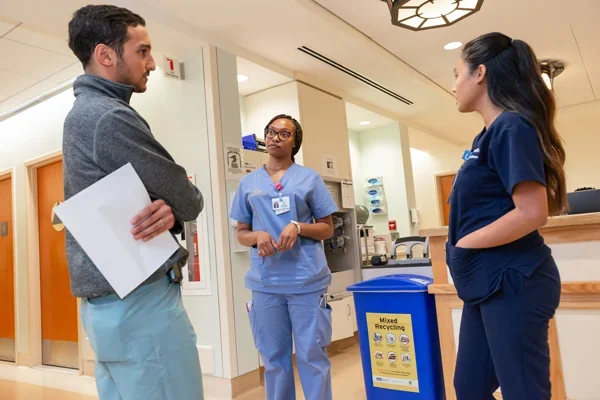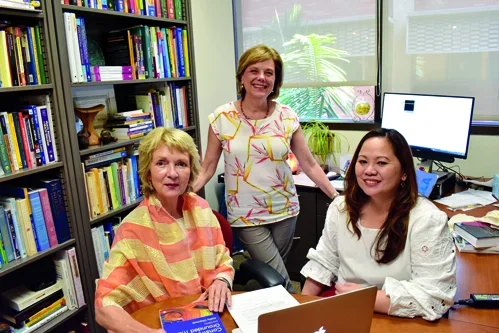Academic Health Centers and Academic Nursing – A Formula for Long-term Success.

In today’s healthcare landscape, nursing schools are seizing new opportunities within academic health centers to improve health outcomes and create new models for nursing care. This synergy helps to prepare the nurses of the future and invest in better ways to integrate nursing research into clinical practice.
Creating The Ideal Partnership
On the corner of Charles E. Young Drive and Westwood Plaza in the heart of the UCLA campus, lies one of the top hospitals in the country, Ronald Reagan UCLA Medical Center, part of the UCLA Health System. Housed under one roof, you will also find Resnick Neuropsychiatric Hospital and UCLA Mattel Children’s Hospital and a mere three miles down the road, UCLA Medical Center Santa Monica. In addition, there are multiple clinics and ambulatory care centers throughout Southern California. UCLA Health has nearly 4,000 registered nurses – the largest group of employees -- and many are graduates from the School of Nursing.
Just one block away from the medical center is the UCLA School of Nursing, consistently ranked among the top nursing schools in the world. Proximity and commitment to excellence by both entities makes for an ideal academic/clinical collaboration.
“To educate the nurse leaders of tomorrow, it is critical to have a strong relationship with a clinical partner. We are so fortunate to be on a campus with a premier academic health center” said Linda Sarna, dean of the UCLA School of Nursing. “
“We have created a place where students can apply knowledge from the classroom to patient care, where they can thrive and grow, a place where they can use their skills at the highest level of their license,” added Karen Grimley, Chief Nursing Executive for UCLA Health and Assistant Dean at the School of Nursing. “UCLA is where faculty and clinicians are making that happen.”

A one-on-one student experience
By the time that prelicensure students are ready to have their first clinical experience, they have already spent many hours in the classroom and in the simulation lab at the School. They are ready to put that classroom learning into practice.
Two years ago, a dedicated education unit was introduced at UCLA Santa Monica Hospital. Unlike the traditional model for clinical rotations where a group of students are assigned to a clinical instructor and focus on one patient, in the dedicated unit, one student is assigned to one nurse during his/her shift and spends a full quarter as a member of the team. This allows the students to experience the fast-paced, multi-faced role of a practicing nurse. Since its launch, 25 students have worked in the Med/Surg unit.

Felisha Cage, a MECN student, just finishing 8-week rotation and loved the experience. “It was wonderful to build a relationship with one nurse. Through our interaction you gain his/her trust and are provided more opportunities. Because I was the only student on the floor during my shift, other nurses invited me to participate in or view a procedure. When there are 10 students on a floor at the same time, that can’t always happen.”
Paulette Madley, the unit director on the Med/Surg floor, is excited about what this dedicated unit provides to students: “It is a really nurturing environment – it gives them a comfort level which leads them to take ownership of their own practice. We’ve gotten a lot of positive feedback from the students and our nurses.
The dedicated education unit is just one component of the Center for Nursing Excellence at UCLA Health. The Center is designed to support nurses in their growth and development and set them on their journey of life-long learning, starting with their clinical placement and on through their entire career. .
Another important component of the Center for Nursing Excellence is the research and evidence-based practice program.
The role of a nurse scientist in a hospital setting
Opportunities to benefit from research is a unique advantage for patients receiving care at Academic Health Centers. Pamela Miller, a PhD graduate from the UCLA School of Nursing and senior nurse scientist in the Center, oversees the nursing research and evidence-based practice program at UCLA Health.
From their bedside viewpoint, clinical nurses are well-positioned to bring ideas forward to improve care. It is also a laboratory for nursing research conducted by faculty in the School of Nursing. “We strive to engage clinical nurses to unleash their creativity and spirit of inquiry, to educate them through participation in research and evidence-based practice and to facilitate their collaboration with faculty scientists,” said Miller.
“Our efforts accelerate nursing science, bridge the translation of research into practice, and foster the professional growth and development of our clinical nurses,” added Miller. “When nursing practice is informed by scientific research, nurses can more effectively and efficiently utilize the best available evidence to improve healthcare delivery, outcomes and experiences for patients and their families,” added Miller.
The health center and the school encourage partnerships between nursing faculty and clinical nurses to generate new knowledge.

For example, the research focus of Dr. Huibrie Pieters, associate professor, is clinical decision making. She was contacted by two advanced practice nurses at UCLA Health about opportunities to collaborate on clinical research studies. Pieters and Sandra Dewar, a Clinical Nurse Specialist at the UCLA Seizure Disorder Center collaborated on a qualitative study to determine how patients with drug refractory focal epilepsy make complex treatment decisions It is common for these patients to live with disabling and life-threatening seizures for an average of 22 years before considering more effective surgical therapy.
Pieters and Leilanie Ayala, Magnet Program Director and nurse educator at Resnick Neuropsychiatric Hospital, just completed a collaboration on a qualitative study to describe experiences in gardening among adults in the acute psychiatric inpatient setting. They obtained rich foundational data for future research.
Many clinical nurses get inspired by participation in research and decide to return to school. Both Dewar and Ayala are now PhD students in the UCLA program – Dewar is a Robert Wood Johnson Foundation Future of Nursing Scholar entering her third year and Ayala will begin the program in September.
A bright future ahead
When academic nursing partners with an academic medical center, the possibilities are endless.
For the UCLA School of Nursing and UCLA Health, the ultimate goal is to optimize their collaboration in order to advance integrated systems of health care; achieve improved health outcomes, facilitate nursing science and foster new models for innovation.
Grimley and Sarna have relished their collaboration and they are excited about the future of nursing in this outstanding Academic Health Center. They concur “In the long-run, the beneficiary of the components of this relationship is the patient and the community we serve.”